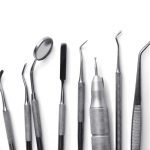WHY Do Our Teeth Become Sensitive?
Most of us consider ourselves to be multilayered people with different shades of our personalities, likes and dislikes. Typically, this means we present many different fronts of who we are depending on the situation and how we feel.
In the much more literal sense, many parts of our body are actually made of multiple layers, too. And while your skin might be the first thing that comes to mind thanks to grade school science classes, your teeth are also a prime example of a body part that is comprised of multiple layers.

All teeth have three layers: enamel, dentin, and pulp.
- The enamel is the outermost layer and is primarily made of calcium phosphate minerals. Enamel is the hardest substance in the human body, and it does not grow back once it’s lost.
- Dentin is the middle layer of the tooth and contains both minerals and tubules leading to the pulp. Dentin is nine times softer than enamel.
- Finally, pulp is the innermost and softest layer of your teeth. It contains living tissues (blood and nerves) that descend below the gum line along with the dentin.
If you have ever called Dr. Ku’s office with tooth pain or sensitivity, it’s most likely due to the formation of the tooth and its innermost lawyers. For all those who have every experienced the sharp and shooting pain that radiates through your mouth when you bite something cold or hot, keep reading to learn exactly why you are experiencing tooth sensitivity.
Ouch! What was that?
The pain you feel when this happens might make you think you cracked a tooth or lost a filling. And while it’s normally not that catastrophic, the pain can still indicate that there is a problem you need to address.
The
most common foods that cause this unmistakable feeling include: sweets
(candy and certain fruits), acidic foods (vinegar, lemons and tomatoes), and hot or cold foods and drinks (teas, coffee or ice cream). Out of all of these, the most common trigger is cold, with 75% of people with hypersensitivity reporting pain upon eating or drinking something icy.
What causes the pain?
As discussed above, the tooth is comprised of three parts. And dentin (the middle layer) is the main cause of tooth sensitivity. Tooth sensitivity, sometimes also called dentin hypersensitivity, can be caused by anything that exposes dentin, including brushing too hard, eating acidic foods, cracking your tooth, or using too much over-the-counter whitening product that wears down enamel.
It’s important to note that a degree of dentin sensitivity is normal, but pain is not usually experienced in everyday activities like drinking a cold one. Some researchers believe that when the dentin is exposed to hot or cold temperatures, the fluid inside the tooth (in blood vessels, for instance) will increase. The vessels in the tooth are on average 0.5 to 2 micrometers in diameter and carry fluids away from the pulp. When more fluid is pushed through due to contact with hot or cold temperatures, it can cause the vessels to expand and push on the innermost layer, the pulp. That interaction is what causes the pain.
What causes dentin exposure?
There are two common ways in which dentin can be exposed: gingival recession and tooth wear. The main cause of dentin sensitivity is gingival recession (i.e., receding gums) which causes the exposure of root surfaces. A less-common cause is acid erosion, which is the loss of hard dental tissues due to acids.
Dental treatment for sensitive teeth
If you are one of the 40 million Americans who has experienced this pain, you need to call a dentist practice like Dr. Ku’s in Fort Worth for an exam. There is no single treatment option that works for all who suffer this problem. Once your dentist diagnoses the underlying cause of the pain, he or she can tailor a treatment plan suited to your needs. Some in-office solutions include root canals and surgical gums grafts or bonding that can cover exposed roots. In some cases, since tooth sensitivity can be the result of tooth grinding, your dentist might even recommend a mouth card to protect your enamel while you sleep.





